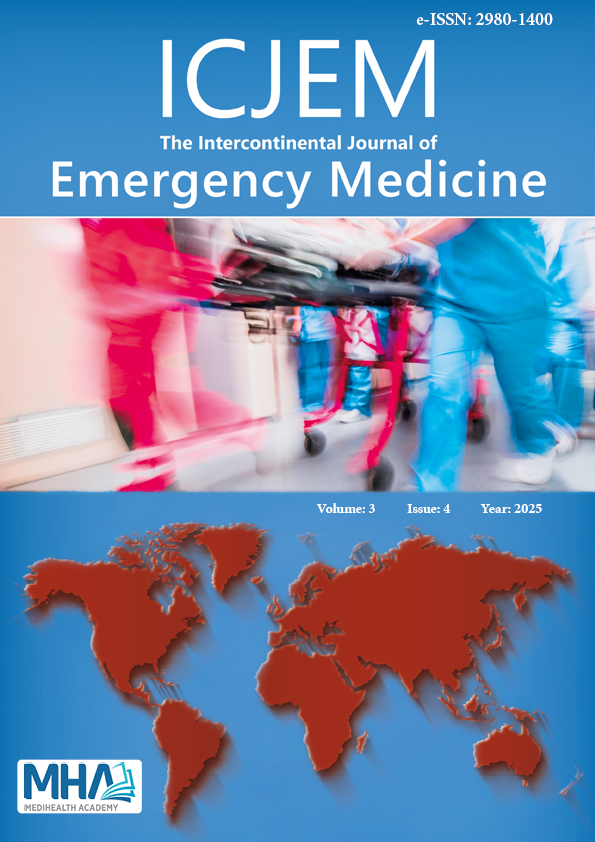1. Özdemir Ö. Acil serviste herediter anjioödem’e yaklaşım. Sakarya TıpDerg. 2020;10(1):152-161. doi.org/10.31832/smj.627591
2. Orhan F, Civelek E, Şahiner Ü, et al. Anaphylaxis: Turkish nationalguideline. 2018. doi.org/10.21911/aai.2018.1
3. Busse PJ, Christiansen SC, Riedl MA et al. US HAEA medical advisoryboard 2020 guidelines for the management of hereditary angioedema.JAllergy Clin Immunol: In Practice.2021;9(1):132-150. doi.org/10.1016/j.jaip.2020.08.046
4. Bork K, Meng G, Staubach P et al. Hereditary angioedema: newfindings concerning symptoms, affected organs, and course. Am J Med.2006;119:267-74. doi.org/10.1016/j.amjmed.2005.09.064
5. Baran M. Hekimlerin herediter anjioödem hastalığı hakkındafarkındalık düzeylerinin değerlendirilmesi. Necmettin ErbakanÜniversitesi, Meram Tıp Fakültesi, İç Hastalıkları Anabilim DalıUzmanlık Tezi, Konya, 2016.
6. Locascio EJ, Mahler SA, Arnold TC. Intestinal angioedemamisdiagnosed as recurrent episodes of gastroenteritis.Western J EmergMed. 2010;11(4):391.
7. Ertekin A. Anjioödem/Angioedema. Bozok Tıp Derg. 2019;9(1):160-165.
8. Özdemir Ö, Elmas B. Prevalence and clinical manifestations ofhereditary angioedema in untested close and distant blood relatives ofhereditary angioedema ındex patients in a city, Turkey. J Acad Res Med.2017;7(2). doi: 10.15406/moji.2016.03.00075
9. Riedl MA, Banerji A, Gower R. Current medical management ofhereditary angioedema: follow-up survey of US physicians.AnnalsAllergy Asthma Immunol. 2021;126(3):264-272. doi.org/10.1016/j.jaip.2014.08.017
10. Mete Gökmen N, Gülbahar O, PekerKoç Z, et al. How familiar areinternists with a potentially deadly orphan disease? Hereditaryangioedema. Turkiye Klinikleri J Med Sci. 2015;35:72.
11. Cansever Z, Avşar UZ, Acemoğlu H, Deniz A. Tıp fakültesiöğrencilerinin sürekli mesleksel gelişime yaklaşımları. Ankara Med J.2016;16:2.
12. Bowen T, Cicardi M, Farkas H, et al. 2010 International consensusalgorithm for the diagnosis, therapy and management of hereditaryangioedema. Allergy Asthma Clin Immunol. 2010; 6(1):24. doi.org/10.1186/1710-1492-6-24.
13. Fu L, Kanani A, Lacuesta G, Waserman S, Betschel S. Canadianphysician survey on the medical management of hereditaryangioedema.Annals Allergy Asthma Immunol. 2018;121(5):598-603.
14. Terzioglu K, Ediger D, Ozdemir E, TulumenOzturk R, Dogan F, SancarO. How physicians approach hereditary angioedema: a single centerstudy.Asia Pacific Allergy. 2022;12(4):e40.
15. Jaiganesh T, Hugha C, Webster A, et al. Hereditary angioedema: asurvey of UK emergency departments and recommendations formanagement. Eur J Emerg Med. 2012;19(4):271-274. doi: 10.1097/MEJ.0b013e32834c9e1f
16. Salter SM, Vale S, Sanfilippo FM, et al. Long-term effectiveness ofonline anaphylaxis education for pharmacists.Am J Pharmaceut Educ.2014;78(7). doi.org/10.5688/ajpe787136
17. Chong-Neto HJ, Aroni BP, Mansour E, et al. Are pediatriciansfamiliar with hereditary angioedema? World Allergy Organ J.2023;10;16(6):100783. doi: 10.1016/j.waojou.2023.100783

